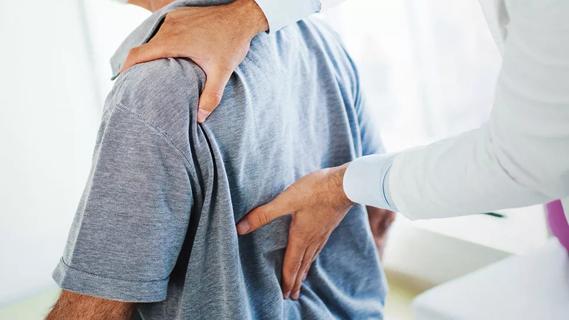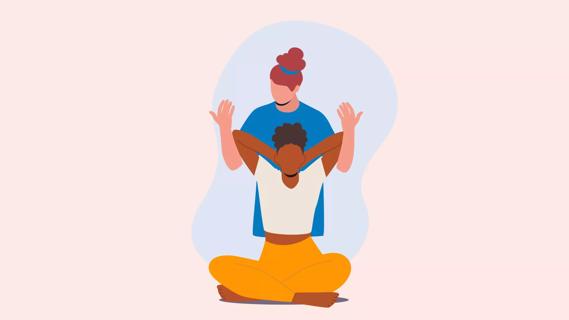Rest, physical therapy, acupuncture and nerve blocks are just a few ways to find relief

With age comes wisdom and experience. Unfortunately, aches and pains tend to tag along for the ride.
Advertisement
Cleveland Clinic is a non-profit academic medical center. Advertising on our site helps support our mission. We do not endorse non-Cleveland Clinic products or services. Policy
Spinal aging may be a fact of life, but that doesn’t mean you have to grin and bear it. Pain management specialist Ellen Rosenquist, MD, shares some of the most common reasons why back pain can develop as you age — and 13 possible ways to address it.
Your spine is a column of 24 bones stretching from your skull to your tailbone, encasing your spinal cord. Its bones, or vertebrae, are linked by tiny joints called facets. In between, disks filled with a jelly-like substance serve as a cushion. Rope-like ligaments stabilize your spine.
The three most common reasons for developing back pain after age 50 are:
Any of these conditions can cause inflammation, pressure on nerves or pain — and it isn’t unusual to have more than one of these conditions. The good news? There are lots of ways to treat age-related back pain, ranging from quick fixes to minimally invasive procedures.
Advertisement
Pain is personal. So is pain relief. Different approaches work for different people — and most people require a combination of therapies to get relief.
When trying to deal with age-related back pain, there are three categories of approaches providers can take before considering surgery: conservative therapies, complementary therapies and advanced therapies.
Conservative or conventional therapies are the first rung in the pain relief ladder — the things you think of first when you’re hurt or injured, like:
If age-related back pain doesn’t improve with conventional treatment, complementary medicine techniques may be added to the mix, including:
If your pain becomes chronic and persistent despite the interventions listed above, Dr. Rosenquist urges you not to wait too long to see a back pain specialist.
“Back pain does not have to destroy your quality of life,” she adds. There are more advanced treatments available that may help, including:
Advertisement
“Combining a wide array of approaches — including conservative therapies — in a comprehensive pain management plan can reduce pain and improve functionality,” she continues.
In other words, you may not find relief from a single treatment. After all, back pain often has more than one cause. That means you may have to mix and match conservative, complementary and advanced therapies with your provider for a while to find the pain management plan that works for you.
It can be discouraging to try therapeutic approaches that don’t help or only help a little. But finding the best treatment option for you is worth the effort and experimentation.
If combinations of the 13 therapies we’ve listed aren’t making a dent in your chronic, age-related back pain, don’t despair. Instead, Dr. Rosenquist recommends letting your provider know. You may be a good candidate for surgery. It’s a last resort, but — for the people who really need it — spinal surgery can make a big, positive difference in quality of life.
The three most common causes of age-related back pain are degeneration of the disks and joints in your spine, stenosis and spondylolisthesis. You could be experiencing one or more of these, too. And there are plenty of other issues and circumstances that could further exacerbate your discomfort.
Advertisement
But despite Father Time’s best efforts, you can find back pain relief. And while back pain often requires a combination of pain-relief techniques, a healthcare provider can help you find the approaches that will work best for you.
Advertisement

Sign up for our Health Essentials emails for expert guidance on nutrition, fitness, sleep, skin care and more.
Learn more about our editorial process.
Advertisement

Hanging upside down for any length of time may decompress the tension in your spine

Drinking alcohol can cause nerve pain, dehydration and weight gain, which can all lead to back pain

Your sleep position, immobility, mattress and underlying conditions can all cause morning back pain

Rest may be all you need to get rid of running-related lower back pain

It’s always a good idea to let a healthcare provider know about any back pain you’re experiencing, especially if it results from trauma or persists longer than three months

From physical and biofeedback therapy to nerve ablations and blocks, there are many nonsurgical options for managing back pain

Get moving, use cold packs, and try yoga and stretches to ease back pain

Back spasms, shingles and disk conditions can all feel like a burning sensation

Even small moments of time outdoors can help reduce stress, boost mood and restore a sense of calm

A correct prescription helps your eyes see clearly — but as natural changes occur, you may need stronger or different eyeglasses

Both are medical emergencies, but they are very distinct events with different causes